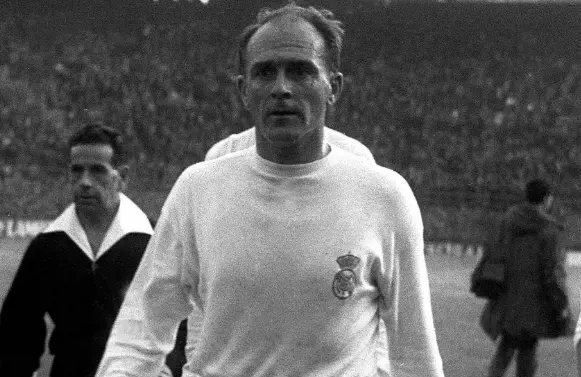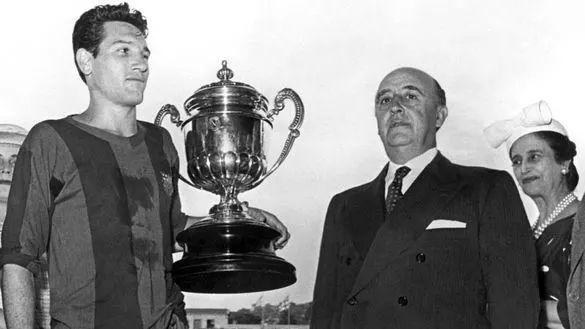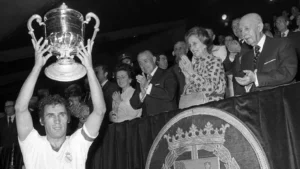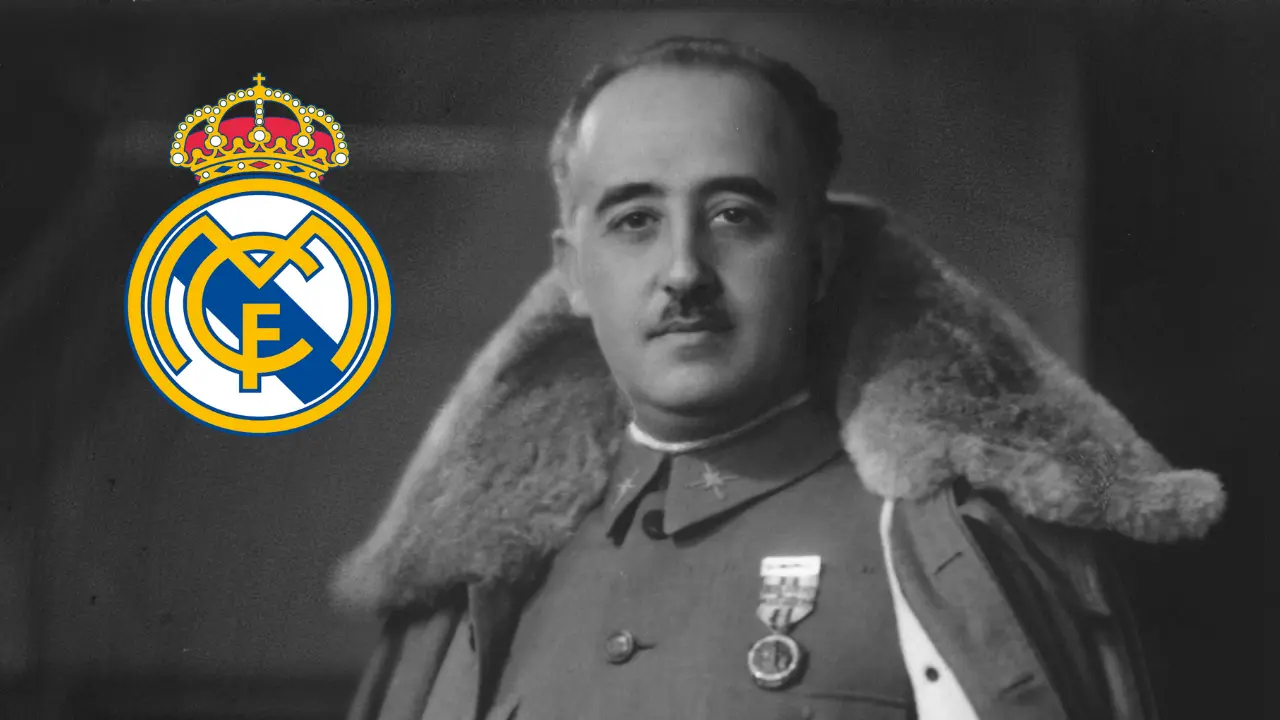If you’ve ever scrolled through football debates online, you’ve probably seen the line: “Real Madrid were Franco’s team.”
It gets thrown around whenever Madrid’s historic dominance is discussed — especially by Barcelona fans.
The claim suggests that Spain’s dictator, Francisco Franco, who ruled from 1939 to 1975, gave Madrid special treatment and used it as his personal propaganda machine.
But is that really true? Or is it another story where myth, politics, and football rivalry get mixed? Let’s dig in.
The Story of Real Madrid and the Franco Regime
The Di Stéfano Transfer Saga

How the Chaos Began
In the early 1950s, Alfredo Di Stéfano was the most sought-after footballer in the world. Both Barcelona and Real Madrid wanted him.
The problem? He was playing for Colombian club Millonarios while River Plate, his old team in Argentina, still claimed his rights.
That meant any deal was going to be messy. Barcelona thought they had it done — Di Stéfano even wore their shirt in a friendly.
But suddenly, the move collapsed, and he ended up signing for Real Madrid.
Franco’s Role?
Here’s where the conspiracy theories come in. Some claim Franco’s regime pressured Barcelona to back out of the deal.
Others say Barca’s own negotiator deliberately sabotaged it while working for Franco.
What we know for sure is this: Francoist officials liked to meddle in Spanish football, and the Di Stéfano case was confusing enough for political influence to make a difference.
But was the dictator sitting in his office pulling the strings of a football transfer? That’s unlikely. What’s certain is that Di Stéfano at Madrid changed football forever.
He led them to five straight European Cups from 1956 to 1960 — and gave fuel to the myth that Franco had gifted Madrid their golden era.
Barcelona, Bilbao, and Suppression Under Franco

Why Regional Clubs Suffered
To understand this rivalry, you need to look beyond Madrid. Franco’s Spain was all about centralisation — one flag, one language, one Spain.
That meant regions with strong identities, like Catalonia and the Basque Country, faced heavy suppression.
- Athletic Club Bilbao was forced in 1941 to change their name to Atlético Club because “Athletic” was considered Basque/English.
- Barcelona were told to remove the Catalan flag from their crest and change their name to Club de Fútbol Barcelona.
Language, traditions, and symbols tied to Catalan or Basque identity were banned. Football clubs became political targets because they carried those identities proudly.
The 11–1 Clásico
One of the most famous legends comes from 1943. Barcelona beat Real Madrid 3–0 in the first leg of a Copa semi-final.
Before the second leg, it’s said regime officials visited Barca’s dressing room and “reminded” players of Franco’s generosity in letting them play at all.
The second leg finished 11–1 to Madrid — the biggest Clásico win ever. Was it pure football, intimidation, or both? Nobody knows for sure.
But it added to the narrative that Real Madrid were protected while Barca were punished.
Real Madrid’s Own Struggles Under Franco
The Forgotten Years
Here’s the part most people ignore: Real Madrid actually suffered a lot during Franco’s rise to power.
During the Spanish Civil War (1936–1939):
- Madrid’s stadium was bombed.
- Trophies were stolen.
- Many players were jailed, executed, or exiled.
- Presidents and board members linked to the Republican side were imprisoned or killed.
Santiago Bernabéu, who later rebuilt Madrid into a superclub, called that period the darkest in the club’s history.
And despite the myth of “Franco’s favourites,” Real Madrid went 15 years without winning a league title after the Civil War.
At the same time, Barcelona lifted eight La Ligas and nine cups. If Franco had been rigging everything for Madrid, it didn’t show on the league table.
Why Franco Chose Madrid as a Symbol

The Capital Club
So why is Real Madrid still linked with Franco? The answer is simple: politics.
Madrid was Spain’s capital. Franco’s regime was built on centralised power.
Real Madrid, as the capital’s biggest and most prestigious club, naturally became the easiest symbol for the dictatorship to use.
When Madrid started dominating Europe in the 1950s, Franco saw the perfect PR opportunity.
Los Blancos were proof to the world that Spain was strong, modern, and united — even if the reality inside the country was very different.
Football as Propaganda
Madrid’s European glory was more than just football. It was political theatre. Every trophy lifted by Di Stéfano and company was also a propaganda win for Franco.
But here’s the key: Franco didn’t make Madrid great. He took advantage of their greatness.
Barcelona’s Role in Keeping the Myth Alive
Més que un Club
Barcelona has always seen itself as Més que un club (“More than a club”). They aren’t just a football team — they’re a symbol of Catalan identity.
Framing Madrid as “the dictator’s team” strengthens Barca’s own story. Madrid = establishment. Barca = resistance. It’s a simple, powerful narrative that fuels the rivalry to this day.
Modern Flashpoints
Even recently, Barcelona has leaned on this history.
In 2023, during the Negreira referee scandal, president Joan Laporta deflected criticism by accusing Madrid of always being favoured under Franco.
Madrid responded with a four-minute video reminding fans that Franco also supported Barcelona at times — even helping them financially and making him an honorary member.
It shows how history is still weaponised in Spanish football, long after the dictatorship ended.
Was Real Madrid Really Franco’s Team?
Here’s the balanced answer:
- Yes, Franco used Madrid’s success for propaganda.
- Yes, the regime likely interfered in moments like the Di Stéfano transfer.
- But no, Madrid’s greatness wasn’t handed to them. It came from Bernabéu’s vision, Di Stéfano’s brilliance, and the club’s ambition.
The idea that Madrid was Franco’s team is a mix of truth, myth, and rivalry politics.
It survives because it makes the Clásico more than just football — it’s history, identity, and pride all rolled into one.
FAQs
Q: Did Franco directly control Real Madrid?
No. He used their success to project a positive image of Spain, but he didn’t run the club.
Q: Did Barcelona suffer more under Franco?
Yes. Their Catalan identity was directly targeted, and they faced suppression of language, symbols, and traditions.
Q: Who really benefited more during Franco’s rule?
Both clubs had moments of favour and hardship. Madrid became the regime’s symbol because of their success, not because Franco built them up.
Conclusion
So, was Real Madrid really Franco’s team? Not exactly. Franco embraced them once they started winning, but he didn’t create their success.
The myth survives because it adds fire to the greatest rivalry in football. For Barca fans, it explains Madrid’s dominance. For Madrid fans, it’s a story twisted by politics.
In truth, Madrid’s greatness wasn’t gifted by a dictator. It was earned on the pitch — and turned into politics after.
That’s why the debate will never die, because in Spain, football has always been about more than just goals and trophies.


